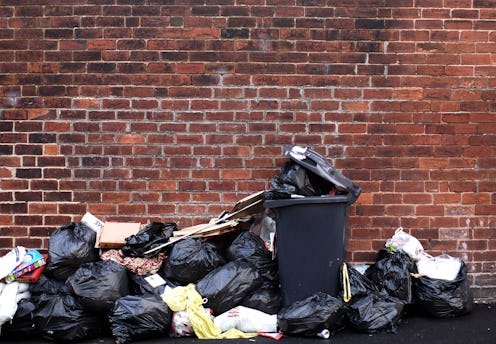Life
5 Important Recycling Rules You Didn’t Know You Should Be Following

The average American produces four and a half pounds of trash each day. If that doesn't sound like a lot to you, multiply it by the amount of people currently living in the country, (326,235,787) you're left with 717,718 tons of trash each day. Of that trash, 75 percent of it can be recycled — and yet most people only recycle about 30 percent of it. Why? The answer is that we likely don't know enough about the process of recycling, or how to be as efficient with it as we could be. These recycling rules you didn't know you should be following are incredibly simple — it's changing the habit of dumping all of your waste into the trash without thinking that's a bit more difficult.
Based on the amount of recyclable trash that gets tossed into landfills each day, it's clear that many don't truly realize how much our actions affect the planet. Our inability to manage trash properly doesn't just increase the amount of trash that ends up at landfills — it increases pollution and endangers wildlife by infiltrating natural habitats and overwhelming natural eco-systems that are not equipped to handle trash.
However, being better at recycling can make a huge difference. Taking the time to recycle one beer can has the power to save enough energy to power a computer for three hours — that's two movies or six episodes of a TV show! But seriously, recycling helps us to save and better utilize our finite resources, it saves energy, and most importantly, it helps to protect the planet by reducing greenhouse gas emissions which effect climate change. TL;DR? We're not very good at recycling, and we need to get better because our lives depend on it.
Here are the basic recycling rules that you can follow to help make a difference.
Sort As You Go
Throwing all of your waste into a garbage bin in the kitchen and promising yourself you'll go through it and sort out the recycling later on is a sure way to not ever recycle. The easiest, cleanest, most fool-proof way to recycle is to start the process in the house. Make sure you have clear garbage bags or recycling bins that are easy to access in the house so that you can separate your trash as it comes. And remember, you must rinse out food and drink containers before disposing of them.
Paper, Not Plastic
Plastic grocery and retail bags are easy to use, comfortable to carry, and great to have around. Except that they're not easily recycled and incredibly bad for the environment. If you don't have a canvas tote with you, always opt for a paper bag that you can recycle. If you do have plastic bags that you'd like to dispose of, check out the Plastic Film Recycling site to find a local grocery store near you that is accepting plastic bag drop offs for proper recycling.
Know What To Recycle
While specifications for recycling can change state to state, what's generally accepted for recycling is divided into different categories: mixed paper or cardboard (newspapers, magazines, catalogs, receipts, wrapping paper, envelopes, including window envelopes, softcover books [no hardcover books], cardboard boxes, including pizza boxes [first throw away the liner], egg cartons, paper towel rolls, and paper cups) and metal, glass, plastic or cartons (soda cans, food cans, spray paint bottles, plastic bottles and plastic food containers, plastic silverware, plastic toys, glass bottles and jars, milk, juice, other liquid cartons, aluminum foil, pots and pans, wire or plastic hangers, plastic hampers, keys, and metal furniture [chairs, filing cabinets]).
Know What Not To Recycle
Tossing things that aren't recyclable into the recycling bin can screw up the whole process. If it goes undetected, it could go through the mechanical system, cause an issue and end up ruining the entire batch of recycling or wasting energy. If you're not sure if something should go into the recycling bin, don't put it there. Here are a few things that people often send off to recycling that are definitely not recyclable: Batteries, plastic bags, squeeze tubes and pouches, plastic foam, food-contaminated paper, hardcover books, bubble wrap, photographs, tissues, napkins, paper towels, waxed or plastic-coated paper.
Make A Plan For The Other Stuff
Things like batteries, electronics, light bulbs, microwaves, smoke alarms, fire alarms, thermometers, large appliances, and non-decontaminated medical equipment are not recycled through the common channels and need to be disposed of in a special way. Earth911 is a website that can help you find what to do with these items.